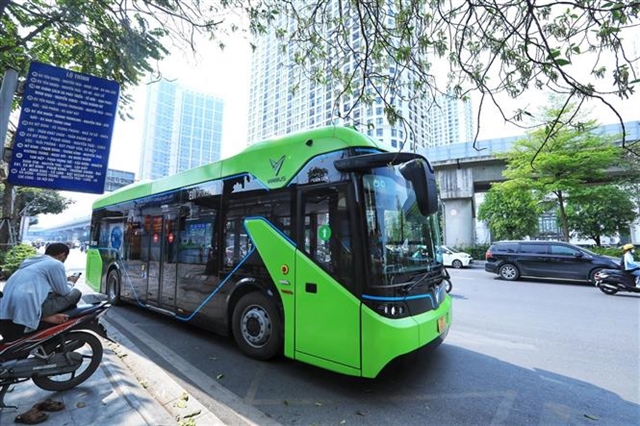 Economy
Economy


|
| Hà Nội aims for full transition to green energy buses by 2030. — VNA/VNS Photo |
HÀ NỘI — The People’s Committee of Hà Nội has issued outlined plans for all buses running on the capital's streets to electric or green energy buses by 2030.
Plan No 149/KH-UBND dated May 28, 2025, outlining a roadmap to replace all fossil-fuel-powered buses before the end of the decade.
This marks a pivotal step in Hà Nội’s push for sustainable public transport and its commitment to reducing greenhouse gas emissions.
According to the plan, the transition will take place in two phases. During the 2025–26 period, the city will focus on finalising supportive mechanisms and policies to encourage businesses to invest in green vehicles and charging infrastructure.
By the end of 2025, green buses are expected to account for 10 per cent of the fleet, rising to between 20 and 23 per cent in 2026. The 2027–30 phase will serve as an acceleration period, aiming to complete the transition to 100 per cent by the end of 2030.
In the initial phase, Hà Nội will prioritise supporting enterprises in accessing capital to purchase vehicles and build electric charging stations, especially fast-charging points at terminal stops, interchanges, and new urban areas. The city will also work closely with the power sector to ensure a stable electricity supply for bus operations.
Bus routes operating within the inner-city area, bounded by Ring Road No 4, will be prioritised for early conversion to reduce noise, cut emissions, and improve the quality of public transport services.
Simultaneously, Hà Nội will revise its bus network to better suit electric vehicle characteristics, ensuring effective integration with the metro, Bus Rapid Transit (BRT), and emerging transport hubs.
To ensure effective implementation, the city will introduce a dedicated resolution through its People’s Council. This will include interest rate subsidies, revised pricing and cost norms, and contract terms tailored to green buses.
Technical standards for shared infrastructure will be developed, and charging station requirements will be incorporated into transport and urban planning schemes to optimise land use and centralise investment.
A city-wide integrated e-ticketing system will also be rolled out in the early stages of Hà Nội’s Smart Transportation initiative, aiming to enhance management efficiency, lower operating costs and improve the passenger experience.
The Hà Nội People’s Committee has tasked the Department of Construction with leading the plan’s implementation, in collaboration with relevant agencies and transport operators. Heads of departments and local authorities will be held directly accountable for the progress and quality of execution. — BIZHUB/VNS




